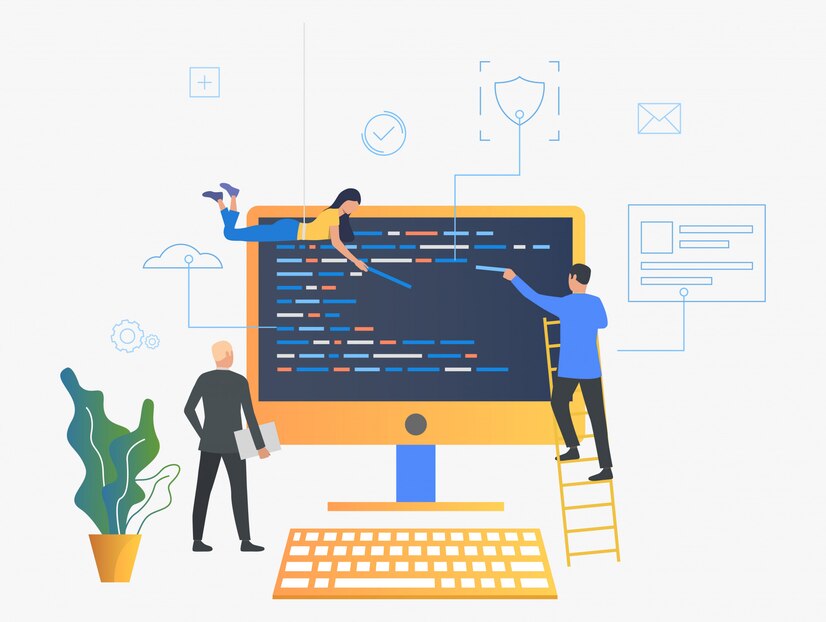What Makes Tokenization a Game-Changer in Protecting Sensitive Data?
Tokenization is transforming the way organizations protect sensitive data by replacing it with unique identifiers, known as tokens, that have no exploitable value. Unlike traditional encryption methods, tokenization minimizes the risk of data breaches by ensuring that sensitive information, such as credit card numbers or personal identifiers, is never stored in its original form. Instead, tokens are stored in secure databases, making them virtually useless to hackers even if they manage to gain access to the system.
This significantly reduces the impact of data breaches and helps businesses comply with strict data privacy regulations, such as GDPR and PCI-DSS. Furthermore, tokenization can be seamlessly integrated into existing data security frameworks, offering an added layer of protection without disrupting operations.

As cyber threats become more sophisticated, tokenization provides a critical safeguard against evolving risks, ensuring that businesses can maintain the trust of their customers while safeguarding their sensitive information. With its ability to reduce exposure to cyberattacks, tokenization is rapidly becoming a game-changer in data protection strategies across industries.
Understanding Data Tokenization Security
Data tokenization security is a critical technique designed to protect sensitive information by replacing it with non-sensitive tokens that have no value outside of a specific system. Unlike encryption, where data can be decrypted with a key, tokenization removes the original data entirely, substituting it with a token that cannot be reverse-engineered. The token itself has no meaningful value to hackers, making it virtually useless if intercepted.
Tokenization is commonly used in industries like finance, healthcare, and retail, where sensitive information such as credit card numbers, personal details, and medical records must be safeguarded. The tokenized data is stored securely in a centralized database, while the original information is either discarded or stored in a highly protected environment.
This method greatly reduces the risk of data breaches and ensures compliance with privacy regulations such as GDPR and PCI-DSS. By isolating sensitive data, tokenization enhances security, reduces exposure to cyber threats, and builds trust with customers, ensuring their personal information remains protected.
What is Tokenization?
Tokenization is a data security technique that replaces sensitive information, such as credit card numbers, personal identification data, or confidential records, with unique identifiers known as tokens. These tokens serve as placeholders for the original data, making it impossible for unauthorized users to access or exploit the sensitive information. Unlike encryption, which requires a decryption key to access the original data, tokens have no inherent value and cannot be reverse-engineered without access to a secure tokenization system.
Tokenization is often used in industries like finance, healthcare, and e-commerce to ensure compliance with data protection regulations, such as PCI-DSS and GDPR. By isolating sensitive data and substituting it with tokens, organizations reduce the risk of data breaches, as the tokens are meaningless without the original information.
Furthermore, tokenization allows businesses to store and process data securely, minimizing the exposure of sensitive information during transactions or when stored in databases. This approach not only enhances security but also fosters customer trust by ensuring that personal and financial data remains protected.
How Tokenized Cybersecurity Systems Work?
Tokenized cybersecurity systems involve using “tokens” to replace sensitive data in a way that enhances security while still allowing for data usage. The core idea behind tokenization is to substitute sensitive information, such as credit card numbers or personal identification details, with randomly generated values called tokens. These tokens have no meaningful value outside of the specific context they are meant to represent. Here’s a closer look at how tokenized cybersecurity systems work:
1. Tokenization Process
- Original Data: A user’s sensitive data (e.g., credit card number, Social Security number) is taken.
- Token Generation: The original data is sent to a tokenization server, which uses an algorithm to generate a unique token to replace the sensitive data.
- Token Storage: The token is stored in a secure database, while the original sensitive data is replaced or discarded.
- Access Control: Only authorized systems or users can access the mapping between the token and the original data, which is kept in a highly secure token vault.
2. Data Usage Without Exposure
- Token Use: When a user or application needs to access or process data, the token is used instead of the original data. For example, in payments, the token can be used in place of a credit card number during transactions.
- Security Advantage: Even if the tokenized data is intercepted during transmission, it cannot be used maliciously because it holds no real value and cannot be reverse-engineered easily.
3. Security Enhancements
- Reduced Risk: Since tokens don’t carry the original data, hackers who gain access to the tokenized data cannot misuse it without access to the tokenization system.
- Segmentation of Data: Tokenization reduces the exposure of sensitive data across systems, reducing the risk of data breaches.
- Compliance: Tokenization can help companies meet regulatory requirements such as GDPR, PCI-DSS (for payment systems), and HIPAA by reducing the scope of sensitive data stored.
4. Use Cases
- Payment Systems: Tokenization is widely used in credit card transactions, where the card number is tokenized to reduce the risks of data theft during processing.
- Healthcare: Tokenizing patient records ensures that sensitive information, like medical histories, is only accessible to authorized personnel.
- Cloud Storage: Tokenization ensures that sensitive data uploaded to the cloud is protected, even if cloud servers are compromised.
5. Challenges and Limitations
- Token Vault: The system that manages the mapping between tokens and original data must be highly secure. If compromised, the security of the entire tokenization process is at risk.
- Complex Integration: Integrating tokenization into existing systems can be complex and may require changes to how data is processed or accessed.
- Limited Use Case: Tokenization works best in scenarios where the data needs to be protected but can be used as a placeholder. In some cases, other encryption or security measures might be more appropriate.
Tokenized cybersecurity systems replace sensitive data with unique tokens to prevent unauthorized access while still enabling data to be used in its tokenized form. This approach is a powerful tool for enhancing security, especially in industries dealing with highly sensitive information.
Advantages of Tokenizing Data Security
Tokenizing data security offers several significant advantages, especially in environments where sensitive information needs to be protected from unauthorized access or breaches. Here are the key benefits of tokenizing data security:
1. Enhanced Data Protection
- Reduction in Data Exposure: Tokenization reduces the risk of exposing sensitive information, as the original data is replaced by meaningless tokens. Even if a hacker gains access to the tokenized data, they cannot misuse it without access to the tokenization system.
- Mitigates Data Breaches: Since the token has no real value outside the tokenization system, it is useless to attackers. This makes tokenization a robust defense against data breaches and leaks.
2. Minimized Scope of Compliance Requirements
- Regulatory Compliance: Many industries are governed by strict data protection regulations like GDPR, HIPAA, and PCI-DSS, which require secure handling of sensitive data (e.g., credit card information, and health records). Tokenization reduces the scope of compliance by replacing sensitive data with tokens, making it easier to meet regulatory standards.
- Fewer Controls on Tokenized Data: As tokenized data isn’t sensitive, fewer controls are required for data processing and storage. This allows organizations to focus security measures on the token vault and tokenization system.
3. Limited Access to Sensitive Data
- Access Control: Tokenization ensures that only authorized personnel or systems can access the sensitive data mapping (i.e., the relationship between the token and the original data). This is usually stored in a secure token vault, which reduces the chances of unauthorized access.
- Data Segmentation: Tokenization helps isolate sensitive data from the rest of the data systems, ensuring that only specific, well-defined systems handle the sensitive data directly.
4. Reduced Impact of Data Breaches
- Value of Stolen Data is Nil: In the event of a data breach, stolen tokenized data is worthless to attackers since the tokens do not represent any actual, usable information without the tokenization system. This limits the financial and operational impact of data breaches.
- Reduces Attack Surface: Because tokenized data is not directly tied to sensitive information, it minimizes the chances of misuse. Attackers can only exploit the tokenized values if they can access the token vault.
5. Simplified Security Management
- No Need to Encrypt Data at Every Layer: Tokenization allows for a simpler approach to security, as there’s no need to apply encryption at every point where sensitive data is stored or transmitted. Instead, tokens replace the need for encryption, reducing the complexity of security systems.
- Streamlined Auditing: Tokenization makes it easier to audit access and usage of sensitive data since only the tokens (not the original data) will be processed in most systems. The auditing focus shifts to the token vault and access control systems.
6. Faster Payment Processing
- Faster Transactions: In payment processing, tokenization can speed up the process because tokens can be processed and stored more quickly than traditional encryption methods. Since tokens are shorter and simpler to handle, the transaction throughput is higher.
- Reduced Processing Costs: By using tokens instead of actual sensitive data, businesses can lower costs associated with secure storage and encryption technologies.
7. Flexibility Across Environments
- Cross-Platform Security: Tokenization is flexible and can be implemented across multiple environments, including cloud, on-premise, and hybrid systems. It ensures that sensitive data remains protected regardless of where it is processed or stored.
- Compatible with Existing Systems: Tokenization can be integrated into existing systems with minimal changes, making it easier for organizations to adopt and enhance their security practices without overhauling their entire infrastructure.
8. Lowered Risk of Fraud
- Secure Transactions: Tokenization is widely used in payment systems, replacing card numbers with tokens. This limits the potential for card fraud because even if attackers intercept the token, they can’t use it for unauthorized transactions. The token is typically specific to the user, device, and transaction.
- Fraud Prevention in Cloud Services: In cloud environments, tokenization ensures that sensitive data, such as user credentials and personal information, is shielded from malicious actors while still allowing authorized access.
9. Seamless User Experience
- No Impact on User Interactions: Tokenization allows organizations to secure sensitive data without disrupting the user experience. For instance, users can still perform transactions, but the underlying sensitive data is protected behind tokens. Tokenization occurs without interrupting normal business operations or interactions.
10. Cost-Effectiveness
- Reduced Risk Management Costs: By significantly reducing the exposure of sensitive data, tokenization lowers the risk of costly data breaches and non-compliance fines. Organizations can save on insurance premiums and remediation costs as a result of improved data security.
- Lower Storage Costs: Tokenized data is usually much smaller than the original sensitive data, which can lead to reduced storage requirements and lower costs associated with data retention.
Tokenizing data security not only protects sensitive information from unauthorized access but also offers advantages like regulatory compliance, fraud prevention, reduced breach impact, and cost savings. By using tokens in place of sensitive data, organizations can safeguard customer information, simplify their security infrastructure, and minimize their exposure to data risks.
Tokenization Security Solutions for Businesses
Tokenization security solutions provide businesses with a powerful way to protect sensitive data by replacing it with unique tokens that hold no real-world value outside the secure environment of the tokenization system. Below are key tokenization security solutions for businesses, explaining their features, benefits, and potential use cases:
1. Tokenization as a Service (TaaS)
- Description: Tokenization as a Service (TaaS) is a cloud-based solution where a third-party provider handles the tokenization process, storage, and management of sensitive data. This solution allows businesses to offload the complexities of tokenization to a trusted service provider.
Features:
- Cloud-based scalability
- Secure token vault for storing sensitive data mappings
- Integration with payment systems, CRMs, and other enterprise applications
- Compliance with industry standards like PCI DSS, GDPR, and HIPAA
Benefits:
- Reduces infrastructure costs
- Simplifies compliance efforts
- Scalable to meet growing business needs
- LLow maintenancefor internal teams
Use Cases: E-commerce, payment processing, healthcare, and financial services.
2. On-Premise Tokenization Solutions
- Description: On-premise tokenization involves implementing tokenization systems within the organization’s infrastructure. It allows businesses to have more control over their data and security processes.
Features:
- Local control over tokenization servers and databases
- Customizable tokenization algorithms
- Integration with internal security tools (firewalls, intrusion detection)
- Token vault hosted on-premises
Benefits:
- Full control over security and operations
- No reliance on third-party service providers
- Ability to customize security policies and configurations
Use Cases: Large enterprises, businesses with strict data privacy policies, and industries requiring high-level control over data (e.g., financial institutions).
3. Hybrid Tokenization Solutions
- Description: Hybrid tokenization combines both on-premise and cloud-based tokenization services, giving businesses flexibility while maintaining control over critical aspects of their data security.
Features:
- Data tokenization is done on-premise with secure cloud backup
- Integration of token vaults across hybrid environments (cloud and on-prem)
- Ability to scale cloud resources while maintaining data sovereignty for sensitive information
Benefits:
- Provides scalability of the cloud with the control of on-premise solutions
- Optimizes performance and availability
- Offers redundancy for disaster recovery and business continuity
Use Cases: Organizations with a mix of sensitive and non-sensitive data, businesses transitioning to the cloud, or those requiring flexibility for specific data sets.
4. Payment Tokenization Solutions
- Description: Payment tokenization is specifically designed to protect credit card and transaction data by replacing sensitive payment details with tokens. This solution is widely used in e-commerce and financial services.
Features:
- Tokenization of credit card numbers, bank account details, and other payment information
- Integration with Payment Card Industry Data Security Standard (PCI DSS) compliance requirements
- Support for mobile payments, point-of-sale (POS) systems, and online transactions
- One-time use tokens for single transactions or reusable tokens for recurring billing
Benefits:
- Protects sensitive payment information from fraud and theft
- Reduces the scope of PCI DSS compliance by eliminating the need to store cardholder data
- Reduces liability in case of a breach
Use Cases: E-commerce websites, financial institutions, subscription-based services, and mobile wallets.
5. Healthcare Tokenization Solutions
- Description: Tokenization in healthcare helps protect patient data (e.g., health records, personal identification information) by replacing it with tokens, ensuring compliance with HIPAA and other healthcare regulations.
Features:
- Tokenization of personal health information (PHI) and personally identifiable information (PII)
- Integration with Electronic Health Records (EHR) and Health Information Exchanges (HIE)
- Secure storage and sharing of patient data
- Ability to maintain data integrity and traceability
Benefits:
- Ensures confidentiality and privacy of patient information
- Helps healthcare organizations comply with HIPAA regulations
- Reduces the risk of data breaches and medical identity theft
Use Cases: Hospitals, clinics, health insurance companies, and telemedicine platforms.
6. Tokenization for Cloud Security
- Description: Cloud tokenization solutions ensure that sensitive data stored in cloud environments is tokenized, mitigating risks related to data exposure and ensuring compliance with cloud security standards.
Features:
- Tokenization of data before storing it in the cloud
- Cloud-native integration for popular cloud providers (AWS, Azure, Google Cloud)
- Secure token vault in the cloud with encryption
- Data masking and anonymization features for non-sensitive data
Benefits:
- Secures sensitive data in cloud storage without compromising accessibility
- Prevents data exposure during cloud data migrations
- Provides peace of mind for organizations adopting cloud infrastructure
Use Cases: SaaS platforms, cloud service providers, and companies migrating to or utilizing cloud storage solutions.
7. Enterprise Tokenization Platforms
- Description: Enterprise tokenization platforms provide an end-to-end solution for securing sensitive data across various business units, from HR to finance to operations, by tokenizing sensitive records.
Features:
- Cross-functional tokenization support (financial, personal, and operational data)
- Comprehensive audit trails and reporting
- Real-time tokenization and retrieval for secure data access
- Customizable tokenization policies and role-based access control (RBAC)
Benefits:
- Provides an integrated solution for tokenizing data across the organization
- Centralized management of tokenization processes and security policies
- Improved operational efficiency and compliance
Use Cases: Large enterprises with diverse data security needs, multi-department businesses, and industries with high volumes of sensitive data.
8. Tokenization for Identity and Access Management (IAM)
- Description: Tokenization solutions can be integrated with Identity and Access Management (IAM) systems to secure user credentials and enhance authentication processes.
Features:
- Tokenization of user authentication data (e.g., usernames, passwords, biometric information)
- Integration with multi-factor authentication (MFA) systems
- Secure management of tokens used for access control
- Secure delegation of tokenized identities for third-party access
Benefits:
- Improves security for identity verification and user authentication
- Prevents unauthorized access even if tokenized credentials are compromised
- Reduces the risk of phishing and credential-based attacks
Use Cases: Enterprise systems, online platforms, cloud-based applications, and organizations with high-security access requirements.
Tokenization security solutions help businesses protect sensitive data while ensuring compliance with various regulations. These solutions reduce the risk of data breaches, improve fraud prevention, and simplify compliance efforts. Whether it’s for payment data, healthcare records, cloud security, or identity management, tokenization offers businesses an effective way to safeguard critical information without compromising operational efficiency.
Key Applications of Tokenized Data Security Solutions
Tokenized data security solutions are highly versatile and can be applied across a range of industries and use cases to protect sensitive information. Here are the key applications where tokenization plays a vital role in securing data:
1. Payment Processing and Financial Transactions
- Application: Tokenization is widely used in payment systems to protect credit card information and transaction data.
- How it Works: Tokenization replaces sensitive payment information, such as credit card numbers, with non-sensitive tokens. These tokens can be used for transaction processing but cannot be reverse-engineered to access the original data.
- Benefits: Reduces the risk of data breaches in payment systems, ensures compliance with Payment Card Industry Data Security Standard (PCI DSS), and minimizes fraud by preventing unauthorized access to payment details.
- Use Cases: E-commerce platforms, point-of-sale (POS) systems, mobile payment apps, subscription services, and payment gateways.
2. Healthcare Data Protection (HIPAA Compliance)
- Application: Tokenization helps healthcare organizations protect sensitive patient information such as medical records, health status, and personal identification details.
- How it Works: Tokenization replaces protected health information (PHI) and personally identifiable information (PII) with tokens that are meaningless to unauthorized users.
- Benefits: Tokenization ensures patient data remains confidential, helping healthcare organizations comply with HIPAA regulations. It also reduces the risk of data exposure in case of a breach.
- Use Cases: Hospitals, medical clinics, health insurance companies, telemedicine platforms, and electronic health record (EHR) systems.
3. Financial Institutions and Banking
- Application: Tokenization is used in banking to protect sensitive financial data such as account numbers, transaction records, and personal financial information.
- How it Works: Financial institutions tokenize sensitive data, such as bank account numbers and transaction details, ensuring that even if data is intercepted, it cannot be used without access to the tokenization system.
- Benefits: Enhances security for online banking transactions, helps prevent fraud and identity theft, and complies with industry regulations like GDPR, PCI DSS, and SOX.
- Use Cases: Online banking systems, mobile banking apps, investment platforms, and financial trading services.
4. Cloud Data Security
- Application: Tokenization is used to secure data in cloud environments where data privacy and security are a concern.
- How it Works: Sensitive data is tokenized before being uploaded to the cloud, ensuring that even if cloud infrastructure is breached, the actual data remains protected.
- Benefits: Reduces exposure to data breaches in the cloud, simplifies compliance with regulations like GDPR and PCI DSS, and ensures that only authorized users can access the original data through the token vault.
- Use Cases: Cloud service providers, SaaS platforms, and businesses storing sensitive data in public/private cloud environments.
5. Data Privacy in Big Data and Analytics
- Application: Tokenization is used to protect sensitive data while still allowing for the analysis and processing of large datasets.
- How it Works: Sensitive data elements (such as names, social security numbers, or other identifiers) are replaced with tokens before being analyzed, ensuring that sensitive information is never exposed during analysis or processing.
- Benefits: Enables businesses to gain insights from large datasets without compromising data privacy or compliance with data protection laws. It also reduces the scope of data exposure in analytics tools.
- Use Cases: Marketing analytics, customer insights, business intelligence platforms, and research firms analyzing sensitive information.
6. Identity and Access Management (IAM)
- Application: Tokenization enhances security in identity and access management systems by protecting user credentials and authentication data.
- How it Works: User authentication data (e.g., usernames, passwords, biometric data) is tokenized, ensuring that even if the data is intercepted or accessed by unauthorized parties, it cannot be used to impersonate the user.
- Benefits: Strengthens authentication processes by using tokenized credentials, preventing identity theft, and reducing the risk of phishing and credential-based attacks.
- Use Cases: Enterprise IAM systems, multi-factor authentication (MFA) systems, access control for cloud services, and secure login processes.
7. Mobile Payments and Digital Wallets
- Application: Tokenization is a core technology behind mobile payment solutions like Apple Pay, Google Wallet, and other digital wallet apps.
- How it Works: Tokenization replaces sensitive payment card information with a unique token in digital wallets. This token is used to complete transactions securely, without revealing the user’s actual payment card number.
- Benefits: Provides an additional layer of security for mobile transactions, reducing the risk of data theft, and offering seamless user experiences while protecting privacy.
- Use Cases: Mobile payment applications, digital wallets, contactless payment systems, and QR code-based payment methods.
8. E-commerce and Online Shopping
- Application: Tokenization is used to secure customer information in e-commerce transactions, especially in online stores that handle sensitive data like credit card numbers, addresses, and phone numbers.
- How it Works: Tokenized data is used in place of credit card numbers during online transactions. This prevents businesses from storing sensitive data on their systems, reducing the risk of breaches.
- Benefits: Enhances customer trust by securing payment information, reduces the risk of fraud, and helps merchants achieve compliance with data protection laws.
- Use Cases: Online retailers, subscription-based services, digital marketplaces, and loyalty programs.
9. Supply Chain and Vendor Management
- Application: Tokenization is used in supply chain management to secure sensitive vendor and transactional data.
- How it Works: Tokenization can be applied to secure information related to suppliers, purchase orders, and invoices, ensuring that sensitive data is not exposed to unauthorized parties during the exchange of information.
- Benefits: Enhances data security in supply chain processes, prevents fraud, and ensures the integrity and confidentiality of vendor and transactional data.
- Use Cases: Logistics companies, manufacturers, retailers, and businesses with complex vendor networks.
10. Government and Public Sector Data Protection
- Application: Tokenization can help government agencies protect sensitive citizen data, including social security numbers, tax records, and personal identifiers.
- How it Works: Sensitive citizen data is tokenized, ensuring that even if a breach occurs, the tokens are meaningless without access to the tokenization system.
- Benefits: Enhances security and compliance with government regulations like GDPR and CCPA, while ensuring that sensitive citizen data is not exposed or misused.
- Use Cases: Tax authorities, national registries, e-government services, and public health data systems.
11. Legal and Compliance Data Protection
- Application: Tokenization ensures that sensitive legal documents, contracts, and personal data are protected throughout the legal and compliance processes.
- How it Works: Legal documents and case files are tokenized, ensuring that confidential information is never exposed to unauthorized individuals or third parties during legal proceedings or compliance checks.
- Benefits: Reduces the risk of data leakage in legal processes and helps ensure compliance with data protection regulations like GDPR, HIPAA, and others.
- Use Cases: Law firms, corporate legal departments, compliance management, and document management systems.
Tokenization offers a versatile solution for protecting sensitive data across a wide range of industries and applications. It enhances data security, reduces compliance burdens, and mitigates the risks of data breaches, fraud, and identity theft. Whether for payment systems, healthcare, cloud storage, or mobile applications, tokenization is an essential tool for businesses aiming to secure their data in today’s increasingly interconnected and regulated digital landscape.
Future Trends in Tokenized Data Security
The future of tokenized data security is set to evolve in response to the growing need for more robust, scalable, and efficient ways to protect sensitive data in an increasingly interconnected world. Several emerging trends are shaping how businesses will implement tokenization and leverage it for greater data security. Here are some key future trends in tokenized data security:
1. Integration with AI and Machine Learning for Enhanced Security
- Trend: Tokenization is expected to integrate with artificial intelligence (AI) and machine learning (ML) technologies to create more adaptive and intelligent security systems. These technologies can analyze patterns in data usage, detect anomalies, and optimize tokenization strategies in real time.
- How it Works: AI and ML algorithms can predict potential threats and adjust tokenization techniques dynamically. For example, they can recognize unusual access patterns and apply more stringent tokenization measures to protect sensitive data.
- Impact: This trend will enhance fraud detection, improve the efficiency of tokenization systems, and provide more proactive, predictive data security measures.
- Use Cases: Fraud detection in financial transactions, intelligent data protection in cloud systems, and AI-driven security in mobile payment platforms.
2. Tokenization for Internet of Things (IoT) Security
- Trend: With the rise of IoT devices, tokenization will play a crucial role in securing the data generated by these devices. As IoT devices collect and transmit sensitive data, tokenization will ensure that even if a device is compromised, the data remains protected.
- How it Works: Tokenization will be applied to the data flowing from IoT devices before it is transmitted to cloud or local storage systems. This ensures that even if the data is intercepted, it cannot be exploited without access to the tokenization system.
- Impact: IoT tokenization will mitigate the risk of data breaches in connected devices, ensuring the security of critical infrastructure and personal information.
- Use Cases: Smart home devices, connected healthcare devices (e.g., wearable health trackers), industrial IoT systems, and automotive IoT systems.
3. Tokenization in Blockchain and Cryptocurrency Transactions
- Trend: As blockchain and cryptocurrencies continue to grow, tokenization will play a significant role in securing digital assets and transactions. Blockchain-based tokenization will ensure privacy while maintaining the transparency and immutability of blockchain networks.
- How it Works: Blockchain networks can tokenize assets (like digital currencies, NFTs, or private keys) to ensure secure transactions while keeping the original data private. For example, tokenized versions of cryptocurrencies may be used in decentralized finance (DeFi) applications to enhance privacy.
- Impact: Tokenization in blockchain will offer enhanced privacy in financial transactions, reduce the risk of cyberattacks, and allow for more secure asset trading in decentralized environments.
- Use Cases: Cryptocurrency exchanges, DeFi platforms, and secure blockchain-based voting or identity systems.
4. More Widespread Adoption of Tokenization in Cloud Security
- Trend: With the increasing shift toward cloud-based services, tokenization will become more commonly integrated into cloud data protection strategies. This will help secure sensitive information and provide greater control over data access in multi-cloud and hybrid-cloud environments.
- How it Works: Tokenization can be implemented at multiple layers of cloud security, from encrypting data in transit to securing data at rest. Additionally, tokenized data will help organizations comply with regulations like GDPR and PCI DSS in the cloud.
- Impact: Businesses will be able to securely store and process sensitive data in the cloud, minimize data exposure risks, and ensure better compliance with global data protection laws.
- Use Cases: Cloud storage providers, SaaS platforms, cloud-based data analytics, and cloud-native applications.
5. Increased Focus on Zero-Trust Architectures
- Trend: Zero-trust security models, which assume that no one (inside or outside the organization) can be trusted, are becoming more popular. Tokenization will be a key part of implementing zero-trust architectures, ensuring that data is always tokenized and access is strictly controlled.
- How it Works: In a zero-trust model, tokenization ensures that data access is constantly validated and tokens are used for authentication and authorization, reducing the risk of unauthorized access.
- Impact: This will create a more robust security environment where data access is highly controlled and monitored, minimizing the risk of breaches and insider threats.
- Use Cases: Enterprise security, financial services, healthcare organizations, and government agencies adopting zero-trust principles.
6. Regulatory Changes and Tokenization for Compliance
- Trend: As data privacy and security regulations evolve, tokenization will increasingly become a standard practice for businesses seeking to comply with laws like GDPR, CCPA, HIPAA, and PCI DSS.
- How it Works: Tokenization provides businesses with an effective way to reduce the exposure of sensitive data, ensuring that even if data is breached, it is not meaningful without access to the tokenization system.
- Impact: This trend will drive tokenization adoption across industries, particularly in sectors such as healthcare, finance, and e-commerce, where regulatory compliance is critical.
- Use Cases: E-commerce platforms, financial institutions, healthcare organizations, and businesses processing personal data in highly regulated industries.
7. Use of Multi-Tier Tokenization for Granular Data Protection
- Trend: Businesses will move towards multi-tier tokenization, where different levels of data are tokenized based on their sensitivity and risk exposure.
- How it Works: In a multi-tier tokenization model, less sensitive data may be tokenized with less stringent methods, while highly sensitive data (e.g., personal health records, financial data) will use more complex tokenization techniques and stronger access controls.
- Impact: This approach will provide businesses with a more flexible and efficient way to apply tokenization, focusing on protecting the most critical data without overburdening systems with unnecessary tokenization processes.
- Use Cases: Financial services, healthcare organizations, and large enterprises with complex data environments.
8. Tokenization in Privacy-Enhancing Technologies
- Trend: Tokenization will be integrated with privacy-enhancing technologies (PETs) like homomorphic encryption and secure multi-party computation (SMPC) to allow organizations to process sensitive data without exposing it in plaintext.
- How it Works: Tokenization, when paired with advanced encryption techniques, enables organizations to perform analytics or data sharing without revealing the original sensitive data. For example, sensitive data can remain tokenized and encrypted during collaborative research or cross-business data analysis.
- Impact: This combination will provide advanced data privacy while still enabling data to be processed in compliance with privacy regulations.
- Use Cases: Collaborative research, data analytics, cross-business data sharing, and privacy-preserving financial services.
9. Tokenization in Real-Time Data Protection
- Trend: The need for real-time protection of data, especially in high-speed transactions (e.g., in financial trading or healthcare), will push the development of real-time tokenization solutions.
- How it Works: Tokenization works by securing data in real-time as it is transmitted or processed. This ensures sensitive information remains protected throughout the transaction lifecycle, eliminating the risk of exposure.
- Impact: This will enhance security for environments where data is constantly in motion, such as financial markets, e-commerce platforms, and healthcare applications.
- Use Cases: Real-time stock trading platforms, e-commerce checkouts, healthcare data exchanges, and payment processing.
The future of tokenized data security will feature greater automation, seamless integration with emerging technologies like AI and blockchain, and a stronger focus on privacy and regulatory compliance. These advancements will actively reshape how sensitive information is protected, driving innovation and ensuring robust safeguards against data breaches. Tokenization will continue to evolve as a cornerstone of modern data protection strategies, addressing growing threats while enabling businesses to securely manage sensitive data in complex and distributed environments. As businesses face increasingly sophisticated threats and evolving privacy laws, tokenization will remain an essential tool for safeguarding sensitive information.
Conclusion
In conclusion, tokenization stands out as a revolutionary approach to securing sensitive data, offering businesses an effective means of protecting critical information from cyber threats. By replacing sensitive data with non-sensitive tokens, tokenization ensures that even if unauthorized access occurs, the information remains useless to attackers. This level of security not only reduces the potential impact of data breaches but also ensures compliance with data privacy regulations, such as GDPR and PCI-DSS. Furthermore, tokenization seamlessly integrates with existing security infrastructure, allowing organizations to enhance their data protection strategies without disrupting operations.
As cyber threats continue to evolve, the need for robust, innovative security measures has never been more crucial, and tokenization offers a proactive solution that minimizes risk. Tokenization revolutionizes data protection by allowing organizations to safeguard sensitive information effectively. This proactive approach strengthens customer trust and upholds business integrity in an increasingly data-driven world.














Post Comment